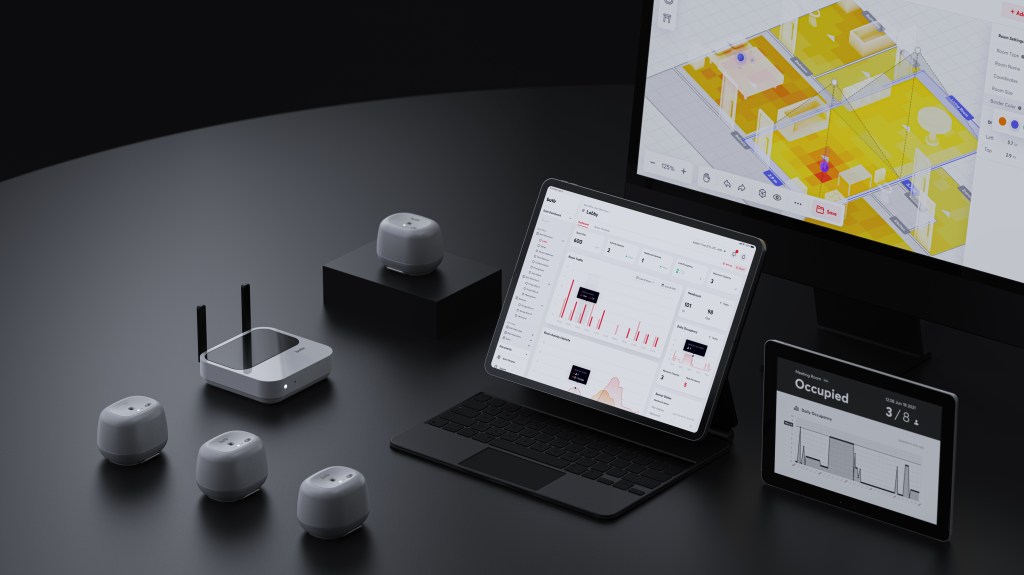A new $7.9 million seed round boosts Butlr Technologies’ ability to apply its real-time people-sensing technology beyond commercial real estate and retail uses to monitor falls and other movements for active seniors who are aging in place.
Hyperplane led the round, with Founder Collective, Union Labs, 500 Startups, SOSV, E14 Fund, Tectonic Ventures, Scott Belsky, Chad Laurans and Sunny Vu participating.
The new funding comes one year after the Burlingame, California-based proptech company raised $1.2 million in convertible notes, which is included in the $7.9 million. It is developing a platform and Heatic sensors that detect someone’s body heat anonymously to determine occupancy, headcount and activity.
Co-founders Honghao Deng and Jiani Zeng, who spun Butlr out of the MIT Media Lab in 2019, refer to their technology as “Alexa for spatial.” Their wireless sensors capture five frames per second of thermal body heat data — posture, quality of sleep and temperature — and then turn that into insights that customers can use to make decisions on anything from constructing a building to planning how people will coexist in physician spaces.
Deng told TechCrunch the company is “the only one combining accuracy with wireless.” The wireless aspect of the sensors, which can fit in the palm of your hand, means that they can be placed anywhere, require a one-time setup and the batteries last for two years. Butlr is also all about protecting privacy, so the replay doesn’t show faces, but instead the person’s “heat” moving around.
“The sensors can be used in any environment,” Deng said. “It should be invisible and not something people have to worry about. We can bring dignity back to the technology world, while also understanding users’ needs. This is about new things people couldn’t do before, how to use the space in real-time and in a way that is easy to deploy.”
Basic kits, which start at $880, can be purchased from the company’s website, and include space-designing software that someone can use to easily determine where to place the sensors for maximum coverage.

The funding is earmarked for continued market expansion and technology development, including a more advanced API, to meet explosive demand for spatial intelligence — the company is shipping out hundreds of thousands of sensors and grew almost 10 times in revenue last year. Deng expects that to continue as companies figure out their return-to-work policies following the COVID-19 pandemic.
Though Butlr initially started with real estate and retailers, Deng sees potential in other use cases, like car traffic flow and assisted living facilities, where early diagnostics and cognitive function can be monitored before an accident, like a fall, happens.
“The assisted living market is huge,” Deng added. “One of the most important things coming from monitoring is understanding where a person is. We can get early predictions about their frailty.”
For example, by being able to transmit heat signatures in real time, Butlr is better able to detect rigid movements or behavior that looks like falling. This is unlike incumbent technology, which Deng said “misses minutes” during the transmission of the images.
Incumbents are also relying on wearables or health bands, which have to be charged and can be cumbersome to use in a senior care or home health environment. In addition, by having a sensor versus a camera, it also preserves dignity, Zeng said.
Founder Collective partner Eric Paley told TechCrunch that he loved what Butlr is doing because of its “incredible simplicity,” what he called “the holy grail of indoor sensing.”
He’s seen other startups go after this same market and fail due to making it difficult for an average user to set it up or require an electrician. For the sensors to be fixed in one place and be there for years “is huge,” Paley said.
“What they have been able to do at an early stage is impressive,” he added. “There are so many uses for what Butlr’s technology is doing, and many industries are coming after them to use it. We are constantly having conversations on what are the best opportunities, and by having an API approach we can serve lots of customers.”
As tech offices begin to reopen, the workplace could look very different































Comment